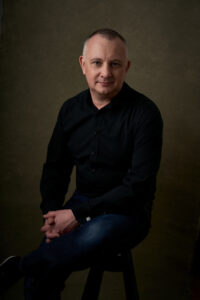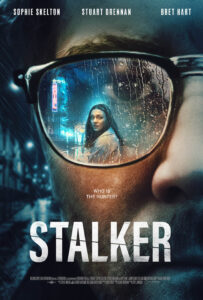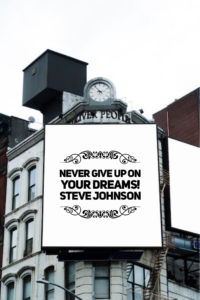
My newest chat is with Steve Johnson from Glasgow, Scotland. He is an award-winning film director and shares with me his joys of directing and the challenges, too. He completed one feature film in just 12 days.
Steve also shares with me advice he would give to someone who is pursuing a career in film and entertainment industry. Learn more about Steve in our chat.
Introducing Steve...
What do you love about your life right now?
I have my health; I have a great and supportive family and I’m feeling creative!
Was there a film or anybody who inspired you to become a director?
Growing up in the 70s and 80s was great from a film perspective and although I wasn’t really thinking about working in the film industry at this point, there were so many inspirational filmmakers that have shaped the film industry as we know it today. The biggest film that impacted me was the original Star Wars. My dad took me to see the film at the Futurist cinema in Liverpool. Funny how that shaped what my company is today, Futuristfilm Ltd. So the inspiration of George Lucas, Steven Spielberg, Francis Coppola, these titans of the film industry really moulded my modern day filmmaking thought process.
Your first film was the award-winning, The Students of Springfield Street, and filmed in 23 days in Scotland. Just from reading a little about it on your website, can you tell me about the inspiration behind it as well as what’s it about?
Students was actually my very first film I ever made. You hear the stories of filmmakers playing with and using Super 8 film, or making short films in their backyard. That wasn’t me. I didn’t really get interested in filmmaking until I was 16/17. I was an exchange student in America back in 1989/90, where I went to high school in Michigan. It was there that I found the interest. Once I returned to the UK, I enrolled in college in practical filmmaking. This was the time when we were using VHS and SuperVHS, editing on tape decks, not as old school as shooting on film, but certainly in the time of drifting away from film and onto tape, which then became digital. I’m telling you this because it was in this period that I came up with a rough idea of Students. This was around the time of Pulp Fiction and the way that film crafted the multi-story threads that tied the entire film together. Multiple stories within one story. So with Students, I wanted to tell the story of six friends within one 24hour period and how their actions could impact others. That was the premise.
It was 20 years before I got round to actually making the film. This was mainly because I moved from Liverpool to Scotland, had to get a ‘real job’ and life goes on. It wasn’t until 2012 that I really sat back down and started to write the script. I think over those 20-years, my view points changed and it certainly wouldn’t have been the same film if I had made it in 1994 on VHS tape. So yeah, we filmed Students over 23 days in Glasgow. We crowdfunded about £5,000 to make the film. For me, this was my film school. The experience taught me what worked, but more importantly, what didn’t work. It went on to win Best Feature Film at the Aberdeen Film Festival in 2017. It certainly helped when I made my second feature film Convergence, which was made for only £3,500. We shot that in 30-days with a very small crew which went on to have more success on the festival circuit. Which is where I met Stuart Brennan. Convergence had its world premiere in Leicester Square, London, where all the big UK premieres are held. Convergence went on to win Best Feature Film at the British Independent Film Festival, which is where it was seen by Stuart.

The film that you have directed more recently is Stalker, a psychological thriller, starring Sophie Skelton, BAFTA winning actor Stuart Brennan and Brett Hart, written by Chris Watt and executive produced by Golden Globe winning producer Gareth Wiley. I have to add, after watching it, I don’t think I will ever get on an elevator again or not with anyone. As a director, how did you prepare to direct it?
Well, that’s great to hear that you enjoyed the film, thanks. It certainly does question who you’re in an elevator with. You’ll look at other people in different ways. With Stalker, Stuart approached me, and it was during the pandemic, to say that he had optioned a script and thought it would make a great small film we could do with a small crew when we had a break between lockdowns. It was mainly a two-hander script with only the two main characters. We had a few chats about it and then, once he was happy with my approach, Stuart tasked Chris Watt and I to do a rewrite. We had a good few months going backward and forward to continually enhance the script to the point of where Stuart was happy, since it was his company, Stronghold, that was going to produce the film.
It was then early 2021 that we started using Zoom to get a small pre-production team together where we would design what I love to think is the third main character in the film: the elevator itself. We did plenty of research into elevators and films that had to use them similarly to what the script showed. We settled on something that would be more visually interesting that a normal silver metal box and agreed that an old freight elevator would be more interesting. Actually, the original title of the film was called Freight which was later changed before the film debuted. So from there, we designed a history for the elevator, what it would look like, what was it used for, so it had a back story which would justify the story beats that needed to happen throughout the film. It was then that the team at Stronghold started the work on building the elevator – and remember, this was all during the pandemic!
Do you have any input on the cast?
It was during this pre-production period that Stuart and I started talking about whom to cast. It was obvious that the main male lead would be Stuart. He is, after all, the producer of the film and was looking for interesting roles for himself. From that, we starting looking at who could be a strong female opposite. Sophie’s name came up very early on in the conversation. We knew we wouldn’t have the biggest of budgets but we were both loving the idea of taking someone who was in a fantastic TV show. It was my wife, Margaret, that suggested Sophie, so I guess I have to give her that credit. From that point, Stuart approached Sophie’s agent to find out her availability and luckily she was available for the short period that we were planning on shooting. It was an incredible experience working with Sophie, who is such an amazing person.
I’ve directed a couple of one-act plays in theatre, and am not sure if it’s like someone directing a film. For those who are not in the film industry, what exactly does a film director do?
A film director makes a lot of decisions. When you’re working with a high calibre of actor, you rely on them to understand their characters fully and then they bring their performance onset. From that point, it’s important to let the actors show you what they think their character should do, how they should act, what’s the meaning behind their actions. Once they deliver their first take, you can then work with them to hone the performance. As a director, you have to be able to see the entire picture and how each scene will flow throughout the story. And that means deciding on costumes, hair and makeup, props, working with DoP on camera angles and lighting. It’s about making decisions and being confident in those decisions.
As a film director, what are the challenges?
For Stalker, the main challenge was what we had to achieve each day. Remember, we filmed Stalker in 12 days between lockdowns. So we had masks and covid to deal with. With a script like this, and it’s a great script that Chris wrote, you can’t go anywhere. The entire film, well 95% of the film, is in that elevator. You don’t leave, so the challenge with this film was how to make each scene or sequence interesting. And they were long scenes. I think we averaging about 8 or 9 pages a day which is mad. On a normal drama, you would be looking at 3-4 pages a day. I often joke with Chris about the scene lengths. I think there’s one scene in there which is about 14 pages and we had to film that over 2 days! But each film you make will present new challenges, but that is half the fun. Asking yourself, how are we going to achieve this? And you know what? You always achieve it, even if the solution isn’t what you thought.

With the challenges, I imagine there are joys. Share with me the joys of being a director.
I would have to say the biggest joy is watching an actor bring their character to life. Whether it’s the dialogue – how they say something, or the way they give a look, an intention they give, that for me is the joy of being a director. Watching a character come to life. For Stalker it was different for me as I hadn’t written the script. But seeing these characters come alive was fun to watch. There is also the joy of working with a strong creative team that isn’t afraid to make suggestions. As a director, you have to captain the ship with one voice, but that doesn’t mean you can’t encourage ideas on set. So long as the ideas don’t battle against the script or against the story as a whole, you shouldn’t be afraid to try things. If something doesn’t work when it comes to the edit, then you don’t include it. But when you have a great team that can make suggestions, that’s when you get the best from everyone.
Who do you look up to in the entertainment industry?
We should congratulate anyone who can make a film and tell a story. I look up to all the filmmakers out in the world. There are so many amazing storytellers, and not the names that we all know, but the struggling filmmakers that all tell stories.

We all have experienced failure, and sometimes success follows it. Do you have a favourite failure?
I think what I’ve learnt in filmmaking and directing is that success usually comes when you least expect it. As a creative, it’s difficult and hard, especially lately here in the UK. Funding is more challenging than ever, so sometimes, it feels like those failures are continuous. But I think the way to look at it is that they aren’t really failures. They are just experiences that teach you how to do things differently, more effectively, better. It’s like writing a script. The first version, that vomit draft, is never the film that you will eventually make. You go back and rewrite the script again and again. It doesn’t mean that the first draft was a failure, it’s just a way to exercise your brain and get what you need onto the page. After that, you hone your craft. Same with making films. Your next film will always be better than the previous film. I guess it depends how you measure failure?
What are you currently working on?
I’m working on several projects at the moment. Some are my own projects, but I’m also working on some exciting scripts and projects with other filmmakers and screenwriters, including Chris, that wrote Stalker. But nothing I can talk about at the moment.
Is there any advice you give to someone who is aspiring to work in the film/entertainment industry?
You have to be resilient. This is a brutal industry and you will get more knock-backs and rejections than you will successes. So it’s important that you realise that from the start. You will have bad days. You will have days where you will think you’re not cut out for this. Or you’re not good enough. Just know that we all have days like that, so make sure you can do something other than work on your filmmaking career. Keep your mental health in a good space.
Who has been your biggest supporter in your life and career?
This follows from your previous question. For me, my biggest supporting in my life is my wife Margaret. She’s the one that has the “proper job”, which has allowed me to follow my career inspirations. Having someone who doesn’t work in the film industry and can be somewhat objective in the choices that you make can be helpful. But having an understanding partner who gets that its famine or feast really helps.
Alright, let’s get the readers to know more about you, Steve. Tell me three fun facts about you. You can share a secret if you dare or not.
Hahaha. Okay. As I mentioned earlier, I was an exchange student back in the late 80s and lived with an American family and went to high school for a year in Michigan. That was an amazing year. Second fact is that I was a pretty decent middle distance runner when I was 14 to 16 years old. I won 3 English Schools 1500m championships. And the third is following on from that is I still hold 2 British running records for the 4x800m relay for Under 20 men and 4x1500m relay for Under 17 men.
If you could have a gigantic billboard anywhere with anything on it, what message would you want to convey to millions?
Never give up on your dreams!

Describe yourself in one word and if you want to expand on that please do.
Resilient
I love ending the chat with a quote. Do you have a favourite quote or saying that has inspired and motivated you in your life that you can share with my readers?
“Steal from the best” – Francis Ford Coppola
Thank you for reading my chat with Steve. I always learn something from my interviews with creatives. The message he would convey to millions is: Never give up on your dreams. It is so easy to just give up if things don’t go your way or you don’t see the success right off. But as he stated in our chat, that success happens when you least expect it. So, to all of you who are pursuing acting, writing, modeling, fitness coaching, or singing, don’t give up!
If you want to learn more about Steve, follow him on social media.
